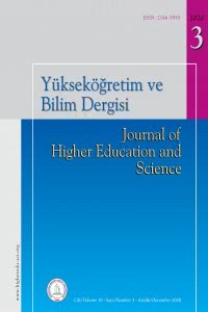ları ve İşlerliği ile Yükseköğretimde Farabi Değişim Programı: Öğretmen Adaylarının Gözünden bir İnceleme
Farabi Exchange Program in Higher Education with its Purpose and Functionality: An Investigation through the Eyes of Pre-service Teachers
___
- Berg, B. L. (1998). Qualitative research methods for the social sciences. Needham Heights, MA: Allyn ve Bacon.
- Bogdan, R. C., & Biklen, S. K. (1998). Qualitative research for education: An introduction to theory and methods. Needham Heights, MA: Allyn ve Bacon.
- Bouwel, L. V. & Veugelers, R. (2009). The determinants of student mobility in Europe: The quality dimension. European Journal of Higher Education, 3(2), 1-44.
- Brindley, R., Quinn, S., & Morton, M. (2009). Consonance and dissonance in a study-abroad program as a catalyst for professional development of pre-service teachers. Teaching and Teacher Education, 25, 525-532.
- Creswell, J. W. (2013). Qualitative inquiry and resaerch design: Choosing among five approaches (Third edition). New York: Sage.
- Cushner, K., & Mahon, J. (2002). Overseas student teaching: Affecting personal, professional, and global competencies in an age of globalization. Journal of Studies in International Education, 6, 44-58.
- Denzin, N. K., & Lincoln, Y. S. (1998). Collecting and interpreting qualitative materials. Thousand Oaks, CA: Sage.
- Faggian. A., McCann, P., & Sheppard, S.C. (2007). Human capital, higher education and graduate migration: an analysis of Scottish and Welsh students ”, Urban Studies, 44(13), 2511- 2528
- Gökçek, T. (2013). Kültürleriçi bir yaklaşım: Farabi Değişim Programı’ndan yansımalar. Eğitim ve Bilim, 38(168), 245-259.
- Guba, E. G., & Lincoln, Y. S. (1989). Fourth generation evaluation. Newbury Park, CA: Sage.
- Günay, D. (2011). Türk yükseköğretiminin yeniden yapılandırılması bağlamında sorunlar, eğilimler, ilkeler ve öneriler. Yükseköğretim ve Bilim Dergisi, 1(3), 113-121.
- Kızılaslan, I. (2010). International experiences of Turkish student teachers: A multiple case study. Journal of Ethnographic ve Qualitative Research, 4, 108-114.
- Kumral, O. & Şahin, A. (2011). Eğitim Fakültesindeki ERASMUS öğrencilerinin beklentileri ve deneyimleri. Uluslararası Yükseköğretim Kongresi: Yeni yönelişler ve sorunlar (27-29 Mayıs, 2011), İstanbul.
- Lee, J. (2009). ESL student teachers’ perceptions of a short-term overseas immersion programme. Teaching and Teacher Education, 25, 1-10.
- McCann, P., & Sheppard, S. (2002). An analysis of the gender determinants of UK graduate migration behavior. Paper presented at the 42nd Congress of the European Regional Science Association, Dortmund.
- McLuhan, M. (1964). Understanding media: The extension of man. New York, NY: McGraw-Hill.
- Meriç, D. & Tokgöz, N. (2015). Farabi öğrencilerine göre Anadolu Üniversitesi’nin kurum imajı: Gelen öğrenciler üzerine bir araştırma. Yükseköğretim ve Bilim dergisi, 5(2), 178-186.
- Ono, H. (2001). Migration patterns among Japanese university students. Paper presented at the Center for Economic Policy Research Conference of the European Network of the Japanese Economy, Oxford.
- Özel, E., Bayındır, N., & Demir (2014). Sınıf öğretmeni adaylarının Farabi programı farkındalık düzeyleri ve beklentileri. Süleyman Demirel Üniversitesi Sosyal Bilimler Enstitüsü Dergisi, 19, 183- 197.
- Patton, M. Q. (1990). Qualitative evaluation and research methods. Newbury Park, CA: Sage.
- Pence, H. M., & Macgillivray, I. K. (2008). The impact of an international field experience on preservice teachers. Teaching and Teacher Education, 24, 14-25.
- Sá, C. & Florax, R. J. G. M. (2004). Determinants of the regional demands for higher education in the Netherlands: A gravity model approach. Regional Studies, 38(4), 375-392.
- Seidman, I. (2006). Interviewing as qualitative research: A guide for researchers in education and the social sciences. New York, NY: Teachers College Press.
- Stachowski, L., Richardson, J., & Henderson, M. (2003). Student teachers report on the influence of cultural values on classroom practice and community involvement: Perspectives from the Navajo reservation and from abroad. The Teacher Educator, 39, 52-63.
- Teichler, U. (2004). Temporary study abroad: the life of ERASMUS students. European Journal of Education, 39(4), 395-408). Willard-Holt, C. (2001). The impact of a short-term international experience for pre-service teachers. Teaching and Teacher Education, 10, 505-517
- Yağcı, E., Ekinci, E., Burgaz, B., Kelecioglu, H., & Ergene, T. (2007). Yurtdışına giden Hacettepe Üniversitesi Erasmus öğrencilerinin memnuniyet düzeyleri. Hacettepe Üniversitesi Eğitim Fakültesi Dergisi, 33, 229-239. Retrieved from file:///C:/Users/user/ Downloads/5000048575-5000066045-1-PB.pdf
- Yıldırım, A., & Şimşek, H. (2008). Sosyal Bilimlerde Nitel Araştırma Yöntemleri. Ankara: Seçkin.
- Yükseköğretim Kurulu (YÖK) (2013a). 2009-2012 Farabi Değişim Programı İstatistikleri. Ankara: YÖK Başkanlığı. Retrieved from https://www.yok.gov.tr/documents/745778/815262/farabi+ istatistik_son.pdf/27d1e314-d003-40be-9300-86050c549cd4 Yükseköğretim Kurulu (YÖK) (2013b). Farabi değişim programı el kitabı. Eskişehir: Anadolu Üniversitesi Matbaası. Retrieved from http://www.yok.gov.tr/documents/745778/758557/ farabi_degisim_progarami_el_kitabi/1a86a009-61a7-4c89- bd0b-cb35b366753a
- ISSN: 2146-5959
- Yayın Aralığı: 3
- Başlangıç: 2011
- Yayıncı: Bülent Ecevit Üniversitesi (Önceden Zonguldak Karaelmas Üniversitesi)
Tahsin BOZTOPRAK, Osman DEMİR, YAKUP EMRE ÇORUHLU
Akademik Yükseltme ve Atama Sürecine Yönelik Öğretim Üyesi Görüşleri
ENGİN DEMİR, CENNET GÖLOĞLU DEMİR, MEHMET ÇAĞATAY ÖZDEMİR
Teknoloji Nedir? Felsefi Bir Yaklaşım
2006’dan Sonra Kurulan Üniversitelerde Rektörlerin 2023 Hedefleri
Sosyal Bilimler Enstitülerinin Lisansüstü Eğitimin Niteliğini Artırmadaki Rolü
ORHAN KUMRAL, ABDURRAHMAN ŞAHİN
Yükseköğretimde Çekirdek Program
